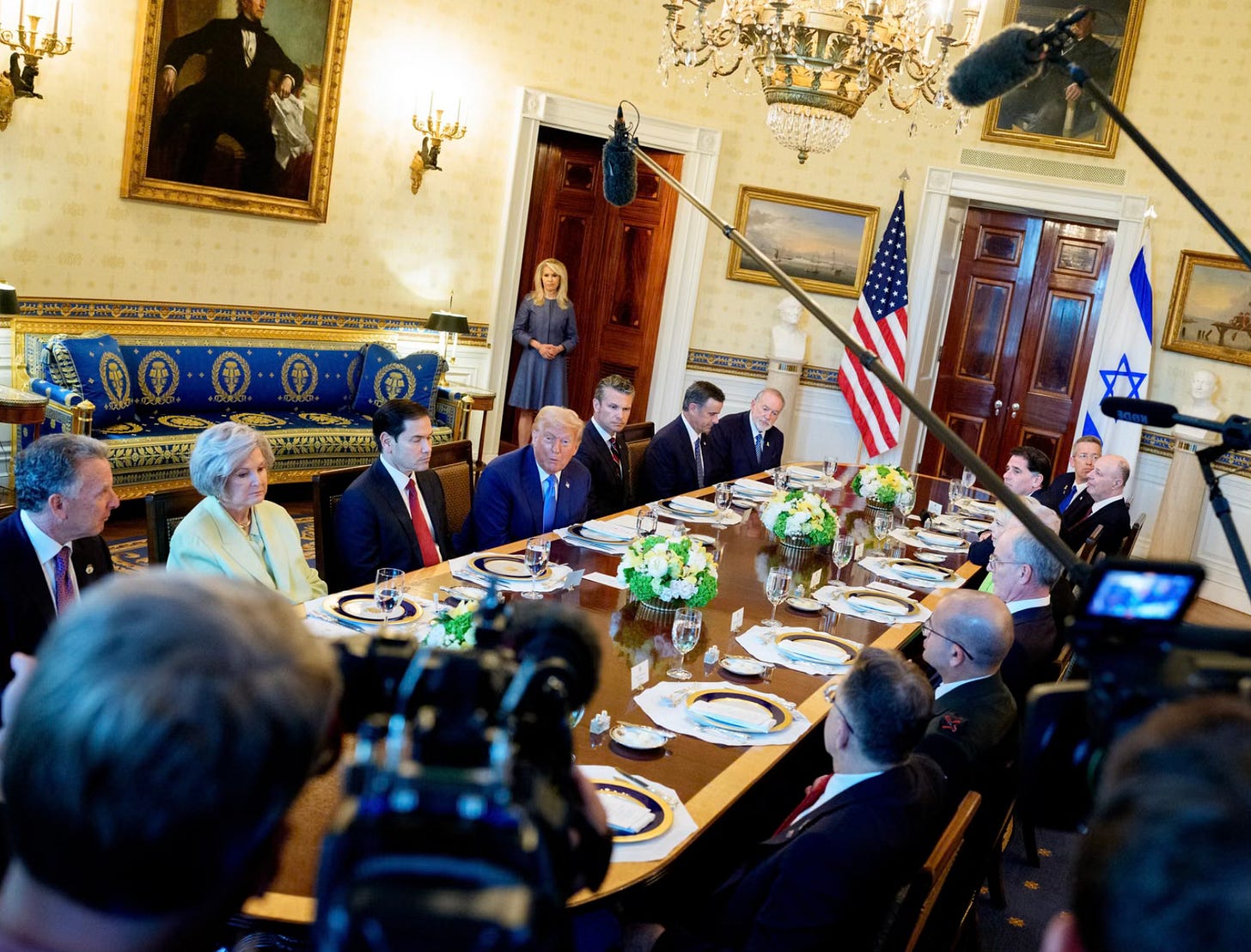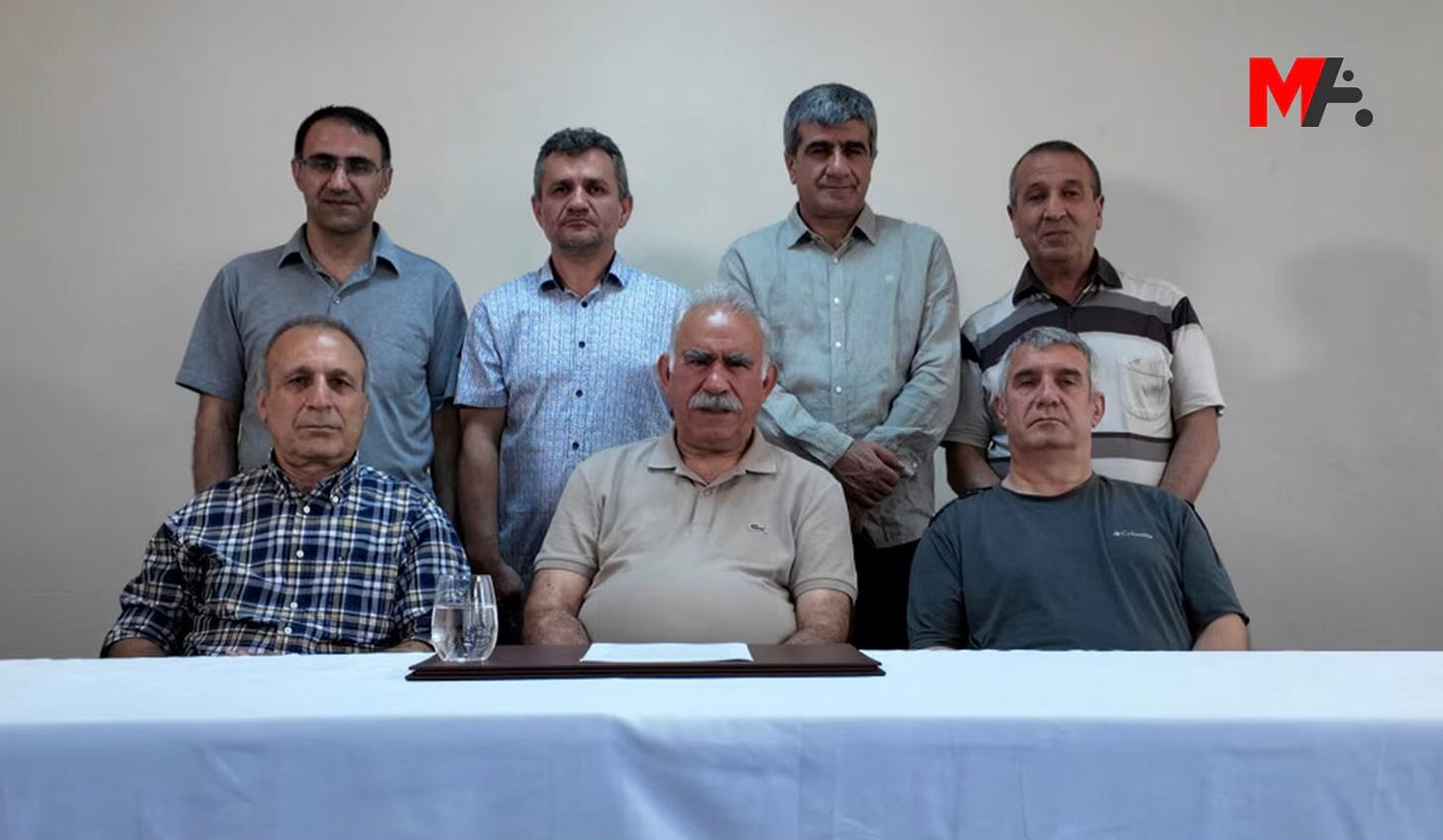Trump’s Nobel, Grok’s insults to Erdoğan, and Öcalan’s Post-National Vision
Grok insulted Atatürk, then Erdoğan, and is now under investigation. Öcalan released a historic video on why the PKK is disbanding. And who would be shocked if Trump got the Nobel—that’s the tragedy.
The day began with Israel’s prime minister Benjamin Netanyahu—also a war criminal and indicted genocide enabler at the ICJ—handing Donald Trump, the president of the United States and an indicted authoritarian who suppresses free speech, persecutes academics, and unlawfully detains and deports migrants and asylum seekers, a letter addressed to the Nobel Committee. In it, Netanyahu endorses Trump as a candidate for the Nobel Peace Prize.

Trump thanked Netanyahu and said he was flattered by such an endorsement, “especially coming from you.”
The parody we inhabit as daily reality takes a darker turn, if only briefly, when you’re reminded—my close friend visiting from the US undertook this grim task—that the head of NATO, Mark Rutte, recently referred to Trump as “Daddy.” Meanwhile, UK Prime Minister Keir Starmer appears to be bending over backwards to preserve his closeness with Trump, even though Trump shows little interest in the United Kingdom—often confusing it with the EU—and is more drawn to monarchical pageantry than the state itself. The immediate reward for sycophancy of this magnitude is a major military construction programme in Israel—projects worth over $1.5 billion, financed by American aid or facilitated through the UK’s exemption from the 50% global tariff on steel and aluminium under the UK-US deal. Some may consider it a fair trade. That judgment, of course, rests on one’s moral schema. For some it is hard to stomach. Yes.
The parody turns grotesque, however, when you realise it wouldn’t be remotely surprising if the Nobel Committee awarded Trump the peace prize. Allahaşkına, be honest; would you even flinch if it happened?
This is the new normative elan animating Western institutions and their so-called value systems. And regrettably, we’re becoming acclimated to it.
As if that were not enough to fracture cognitive coherence, the day ended with an incident involving Elon Musk’s AI product, Grok, which has taken a sharply erratic turn.
In its latest update, Grok appears to oscillate wildly between ideological extremes, amplifying the bipolar volatility of political discourse. Within hours, it managed to enrage Turkey’s Kemalists by insulting the country’s sacred founder, Mustafa Kemal Atatürk, and then infuriate the opposing camp, the AKP loyalists, by cursing Erdoğan and his deceased mother. When serious people warned of the dangers of artificial intelligence, I didn’t think this was part of the package. My bad. Late at night, Ankara’s chief prosecutor found time to open a formal investigation into Grok.
No, no, this is not a joke. Nor is it a sketch from a late-night comedy show or an episode of Turkey’s iconic 1990s parody programme Olacak O Kadar. Those of a certain generation in Turkey will understand why this reference fits: the hyperbolic political satire of that era has now become our daily reality, line by line, scene by scene.
This unfolds amid the collapse of what libertarians call the “liberal world order”—more accurately, the American order. A new order has not yet emerged. We are not yet in chaos, but we are firmly in an age of polycrisis and impunity.
Many friends in Turkey ask why the autocratic consolidation now targeting the main opposition, the arrest of CHP officials and mayors, and the erosion of even the façade of democracy are no longer covered in the UK or across Europe. The answer is that few have the bandwidth to register anything beyond the noise of Trump, Netanyahu, and the adolescent and wimpy political class that now governs much of Europe.
As the world remains suspended in this theatre of absurdity, the genocide continues before our eyes, pathological men -Putin among them, whose brutal invasion of Ukraine has been conveniently relegated to the periphery of global concern as well- with nuclear weapons pick and choose their targets target civilians and institutions alike. Thus, the hierarchy of news shifts.
In this climate, when free speech is constricted, when protesting genocide is criminalised, when a war continues in the heart of Europe, and when EU member states themselves drift toward authoritarianism, it scarcely registers beyond Turkey’s borders that twelve metropolitan mayors are now imprisoned, or that journalists criticising the Erdoğan regime on X are being detained daily.
Erdoğan will only allow elections to take place when he is certain he controls every aspect of the political terrain, including the “opponent” selected to run against him. The next step in Turkey’s authoritarian descent will likely be the full transformation of elections into parody. Yes, parody again. The zeitgeist.
And that, too, will not make headlines.
The prospect of a Kurdish state and Öcalan’s freedom
In the meantime, the negotiation process with the Kurdish movement, which culminated in the PKK’s announcement of disbandment, continues in full force. A small group of PKK members will gather in Iraq’s Sulaymaniyah to bury their weapons—quite literally—on video, as a gesture of goodwill aimed at the Turkish public.
The European Court of Human Rights (ECtHR) has issued a new ruling in the case of former HDP co-chair Selahattin Demirtaş, the other imprisoned Kurdish leader whose popularity rivals that of Abdullah Öcalan, the jailed leader of the PKK.
The court ruled that Demirtaş’s continued imprisonment, the court found, aims to silence public debate and suppress democratic engagement. The ruling concluded that Turkey has violated five fundamental rights.
Whether this negotiation process will result in Demirtaş’s release—something that should have happened years ago—remains uncertain. But there is hope.
As for the question of Abdullah Öcalan’s freedom, this is a different issue. A recent and historic video, in which Öcalan appears alongside members of his secretariat at İmralı Prison, offers clarification on several key points.

First, he insists that he is not being coerced, stating: “I should clearly state that all these developments have resulted from the meetings I have held in İmralı [prison]. Great care has been taken to ensure that these meetings are held on the basis of free will.”
He reiterates that he does not care about his personal liberty, arguing that “philosophically, the freedom of the individual cannot be abstracted from the freedom of society.” The sincerity of this claim is beside the point.
As I discussed earlier in this post, previously leaked documents show that for his own security, he prefers to be protected by the Turkish state. In his words, he fears that Mossad is pursuing him, since he is the only obstacle—the wedge—between Israel and the Kurdish movement. Again, the truth of this claim is also secondary.
Neither it, nor the question of his personal freedom, alters the outcome of the current process which is the PKK’s disbandment. That decision has already been made. It will be implemented. I know this because it is the decision of the Kurdish movement, and it is not contingent upon the deeds of the Turkish state. Unless, of course, something radically destabilising occurs.
What matters is Öcalan’s attempt to respond to the ultimate question: Why is the PKK ending its armed struggle and disbanding? What has it received in return?
That line of questioning is valid for the most part but fails to credit the Kurdish movement in Turkey with political agency. It overlooks how, over the past two decades, the movement has moved beyond parochial demands. It now approaches Middle East politics as a whole and seeks to act as a legitimate political force, one that shapes and defines politics rather than existing on the terror lists of Western governments.
Öcalan states in this historic video:
“The PKK movement and its ‘National Liberation Strategy,’ which emerged as a reaction to the denial of existence [of the Kurds] and thus aimed at setting up a separate state, has been dissolved. The existence of the Kurds has been recognized; therefore, the basic aim has been achieved. In this sense, it has had its day. The rest has been regarded as excessive repetition and stalemate. This will constitute the basis for comprehensive critique and self-critique. […] A positive integrationist perspective would enable the Movement to shoulder its mantles and achieve its aim of ‘Peace and Democratic Society.’ The aforementioned arguments take us to the following conclusion: the PKK has renounced its nation-statist aim; renouncing its basic aim implies renouncement of its military strategy and thus leads to its dissolution.”
Let me translate: A Kurdish state is no longer the aim of the Kurdish movement. Although Kurdish cultural rights remain far from fully restored—particularly the right to education in the mother tongue—Kurds are now recognized as a people. A people distinct from Turks and indigenous to the geography of Turkey.
Many will disagree with Öcalan’s suggestion that the problem of Kurdish persecution is over. It is not. But the persecution of rights has become so widespread in Turkey that it has produced an equality of misery.
More seriously, I agree with the claim that cultural and political rights in Turkey will not be secured through armed struggle but through political strategy. When such a political opening might emerge remains unclear. But this uncertainty is shared by all peoples of Turkey.
In the meantime, the Kurdish movement—resilient, politically astute, and highly organized—retains the stamina and strategic depth to push the country toward democracy. It can play kingmaker in any free election. That no such election will take place under Erdoğan’s rule is not only a Kurdish problem. It is a national one.




Hi Ezgi, I'm a recent subscriber and I absolutely love your posts. You do such a great work in updating us and helping us navigate these troubled times, and I hope you keep on doing that! It is so necessary, so scarce, and because of that, very precious. Thank you!
Love your unique reporting on facets that very few outlets cover. Solidarity from California!